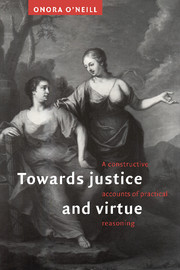Book contents
- Frontmatter
- Contents
- Preface
- Introduction
- 1 Overview: justice against virtue?
- 2 Practical reason: abstraction and construction
- 3 Focus: action, intelligibility and principles
- 4 Scope: agents and subjects: who counts?
- 5 Structure: obligations and rights
- 6 Content I: principles for all: towards justice
- 7 Content II: principles for all: towards virtue
- Bibliography
- Index
6 - Content I: principles for all: towards justice
Published online by Cambridge University Press: 05 June 2012
- Frontmatter
- Contents
- Preface
- Introduction
- 1 Overview: justice against virtue?
- 2 Practical reason: abstraction and construction
- 3 Focus: action, intelligibility and principles
- 4 Scope: agents and subjects: who counts?
- 5 Structure: obligations and rights
- 6 Content I: principles for all: towards justice
- 7 Content II: principles for all: towards virtue
- Bibliography
- Index
Summary
Can abstract starting points and constructive reasoning show what makes institutions just, or characters virtuous? The last three chapters offered accounts only of the focus, of the scope and of some central, significant structural links between practical claims. They did so without relying on the metaphysical or particularist assumptions that lie behind many conceptions not only of justice and of virtue, but of practical reasoning itself. Three basic conclusions emerged. First, practical reasoning must focus on action and use intelligible categories, so must engage with (more and less) abstract act descriptions which can be embodied in varied universal principles. However, universality in this merely formal sense is a meagre matter, which does not define a determinate domain of ethical consideration, let alone mandate uniform action or lack of concern for differences. Second, agents have reason to extend their ethical consideration to those others whom their proposed action already takes for granted, hence, in our world on some occasions, have reason to think of the scope of that consideration as more-or-less cosmopolitan. Third, the principles that are of first importance for ethical reasoning formulate constraints or requirements, hence also provide the basis for obligations and (in some cases) rights, although other ethically significant principles might formulate recommendations or exhortations, condemnations or warnings.
However, no specific principles of any sort have been vindicated. If constructivist reasoning is to lead towards accounts of justice or of virtue, it will have to justify at least some substantive principles without relying on the tried, trusted but untrustworthy strategies that have led to antagonistic conceptions of the two.
- Type
- Chapter
- Information
- Towards Justice and VirtueA Constructive Account of Practical Reasoning, pp. 154 - 183Publisher: Cambridge University PressPrint publication year: 1996



